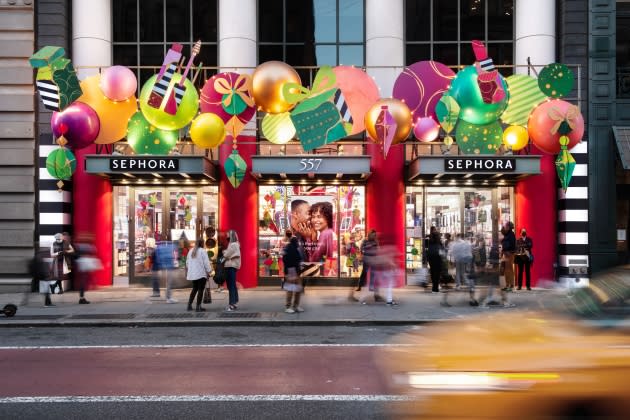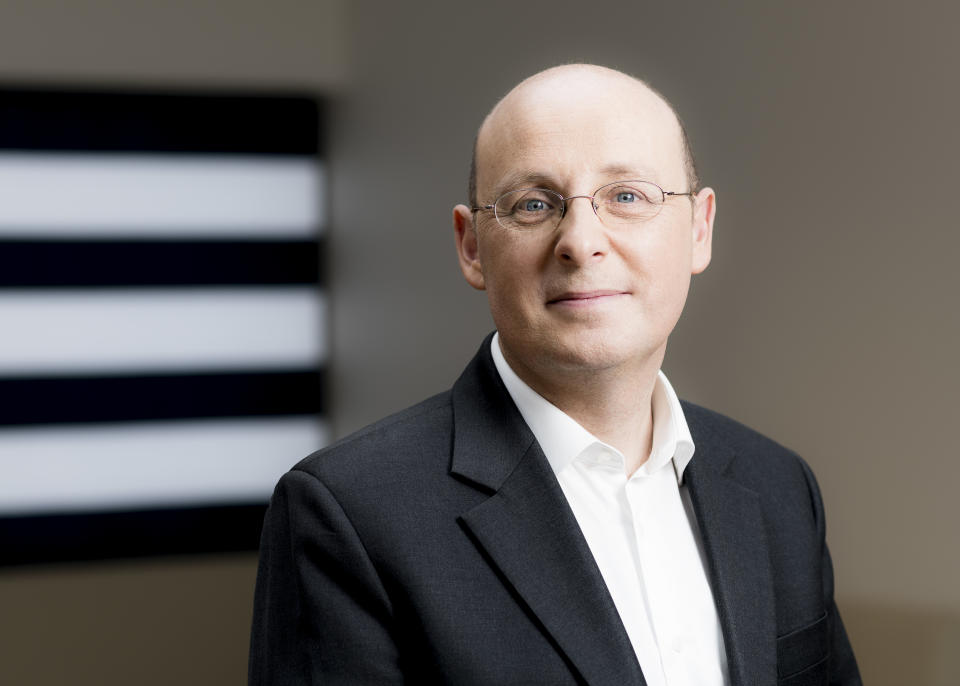What’s In Store for Sephora’s New CEO

PARIS — Sephora’s nomination of a new chief executive officer, Guillaume Motte, comes at a pivotal time for the retailer and the beauty industry at large.
Sephora, the only prestige beauty seller with a global presence, is operating in a swiftly changing, increasingly digital and competitive landscape.
More from WWD
“We appoint a new CEO to take us to the next level,” said Chris de Lapuente, who stepped back into that role following the abrupt departure last June of Martin Brok. De Lapuente has continued serving as chairman and CEO of the Selective Retailing division at Sephora’s parent company LVMH Moët Hennessy Louis Vuitton.
Motte will become Sephora CEO on Jan. 1 and report to de Lapuente.
“Our aspiration is to become the most loved beauty community in the world,” said de Lapuente. “His remit is now: Where do we go next from here? Our possibilities are still ginormous in this industry.”
Motte’s mission is to continue growing Sephora’s sales — which industry sources estimate will surpass the 10 billion euro mark in 2022 — market-share positions and active consumer count, while driving its omnichannel reach.
“As Sephora plans to double its business again in the next five to 10 years, it will be a combination of continuing to win in makeup, skin care and fragrances, but also adding new categories,” said de Lapuente.
Hair care, body care and wellness are among new product categories that might be built upon.
To double business, it’s key for Sephora to gain market share in America and Western Europe, while becoming as prominent in a market such as Asia.
“Sephora has a big opportunity in international expansion as it tries to push into new markets in the U.K., and across Latin America and Asia. Success in new markets could be huge for them, but it is also a risk, as each country has its own dynamics and established competitors,” said Neil Saunders, managing director and retail analyst at data intelligence firm GlobalData Retail. “This downside is amplified by the fact Sephora is embarking on this activity at a time when the global economy is in decline.”
Sephora in 2021 ranked first worldwide among specialty beauty retailers in terms of sales, followed by Ulta, Bath & Body Works and Douglas, according to market research provider Euromonitor International.
Sephora, which also took pole position in the Asia-Pacific region and the Middle East and Africa zone, has more than 5 million visits a day to its stores and websites combined.
In 2021, it opened more than 200 stores, primarily in China, the Middle East and the U.S. Sephora’s digital drive keeps amping up, too. In June of that year, for instance, Sephora and Zalando said they signed a long-term strategic partnership to create a prestige beauty experience online, beginning in Germany.
Sephora has just returned to the U.K. after a 17-year hiatus. On Oct. 17, Feelunique.com, which Sephora acquired one year ago, was transformed into sephora.co.uk. Sephora had left the U.K. in 2005 after staunch competition from retailers such as Boots.
However, the U.K. beauty market has subsequently changed, as has Sephora’s muscle. In part two of its redux, a brick-and-mortar Sephora store will open in a yet-to-be disclosed London location in March.
In Latin America, Sephora ranked ninth last year among beauty specialty stores, with O Boticário, Preunic and Maicao taking the lead, according to Euromonitor.
Sephora opened five stores in the region in 2022, including in Mexico and São Paulo, and introduced brands such as Kylie Cosmetics and Rare Cosmetics in Brazil.
China remains a difficult market for all retailers due to ongoing coronavirus pandemic-induced closures. But on the Chinese island of Hainan, which became a beauty shopping mecca for the country’s denizens who can travel domestically, Sephora is opening its first store.
Also in China, and in Asia overall, Sephora is accelerating its omnichannel and digital presence.
In Singapore, Sephora debuted on Sept. 23 what it dubbed its “Asia store of the future,” a 4,585-square-foot location in the Raffles City Shopping Mall. The store is chockablock with tech, such as interactive Play Tables for skin care and makeup. A second such unit is due to open next in Shanghai.
Altogether this year Sephora is opening 16 stores in Asia, including three franchises in India.

Saunders believes most of Sephora’s challenges are external.
“One of the major difficulties comes from the tightening consumer economy,” he said. “Currently there are a lot of signs that beauty sales are holding up well but this could change if the consumer decides they need to cut back.
“The other potential challenge comes from the U.S., where competition is intensifying as Ulta and others step up their expansion efforts,” continued Saunders.
Ulta Beauty’s business keeps powering ahead. The U.S. retailer reported that sales for the second quarter of its fiscal year, ended July 30, rose 16.8 percent to $2.3 billion.
“Sephora has partnered with Kohl’s to expand its own distribution, but Kohl’s is not in a good place, and there is a risk that, over time, this could turn into another J.C. Penney scenario, where Sephora finds returns from its shops-in-shop at Kohl’s diminish,” said Saunders.
Today, Sephora’s North American business is said to be strong, with ongoing momentum across all categories.
“In North America, Sephora has cracked the code on exactly what a state-of-the-art retailer should look like. With innovative products, compelling merchandising and a deeply engaging consumer experience — they are winning,” said Laura Slatkin, founder of Nest New York. “The challenge and opportunity ahead is to take that winning formula and globalize it. Guillaume brings highly relevant international beauty and retail expertise to both lead and succeed. The correct team is in place to get the job done. I have no doubt about it.
“In addition, Sephora’s off-mall growth strategy is very clever — it brings in new consumers and enables Sephora to expand their reach,” she continued. “For Sephora, every dollar earned at Kohl’s is completely additive — it’s a new consumer, a different audience. Sephora is continuously looking for new ways to expand their consumer base, ensuring its relevance domestically and internationally.”
“Sephora is more successful in the U.S., and I am not surprised to see Artemis rising through the ranks,” said an industry source, referring to Artemis Patrick, who in August was promoted to executive vice president, global chief merchandising officer at the retailer. “I believe her partnership with an LVMH veteran with international experience like Guillaume Motte could make a difference in accelerating Sephora’s performance by being open to applying applicable learnings of the U.S. successes to the rest of the world of Sephora.”
A strong point Sephora should prioritize, according to Saunders, is its product assortment.
“One of the things that differentiates Sephora is its innovative ranges,” he said. “Customers love all the new finds and beauty solutions and these drive repeat visits and purchasing. Sephora should double down on finding and incubating new brands.”
Also regarding brand mix, an industry source said it is “critical” that the retailer strikes a balance between outside brands and those owned by LVMH, including Sephora’s private-label collection.
“They need always to steer between the conflicts of interest that exist in their retail channel,” the source said.
She added another challenge facing Sephora and Motte is to widen European beauty consumers’ focus beyond heritage beauty brands to encompass indie labels more, like in the U.S.
Motte becomes Sephora’s CEO when the retailer has returned to its 2019 activity level.
“As he takes the leadership baton at Sephora, we are poised to close our greatest year ever,” said de Lapuente. “We are gaining market share in almost all our core markets and organization morale is high.”
Motte most recently has been deputy CEO of LVMH Fashion Group, a new position he assumed in May 2021. In that role Motte reports to Sidney Toledano, chairman and CEO of LVMH Fashion Group.
Prior to that, Motte served as president of Sephora Europe and Middle East, beginning in March 2018. There the executive was credited with accelerating the retailer’s omnichannel reach and strong brand-building with the likes of its inclusive campaign, called The Unlimited Power of Beauty.
Motte led Sephora back into Germany after a 16-year absence and inaugurated a new flagship there.
Before joining Sephora he was CEO of French menswear chain Celio for three years. Motte also ran French women’s ready-to-wear brand Jennyfer for more than six years and held positions at other companies, including Al Tayer Trends, FNAC and McKinsey & Co.
Industry sources say Motte is well-respected, well-liked and highly strategic.
“He’s good at [imparting] a vision,” said an industry source. “Guillaume is very analytical.”
As for management style, she said: “He is a good [and modern] leader. Guillaume likes to grow people. He’s really the new generation of retailers.”
— With contributions from Jenny B. Fine

